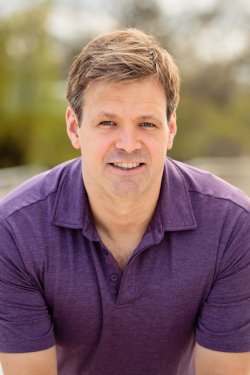William R. Dichtel
2020 National Award Winner — Faculty

Current Position:
Robert L. Letsinger Professor of Chemistry
Institution:
Northwestern University
Discipline:
Organic & Polymer Chemistry

Current Position:
Robert L. Letsinger Professor of Chemistry
Institution:
Northwestern University
Discipline:
Organic & Polymer Chemistry
Recognized for: Pioneering methods to create porous materials from simple, carbon-based building blocks. These materials can be easily designed and tailored to address specific needs. He discovered porous materials derived from corn that are now being used commercially to remove toxic substances such as industrial pollutants and pharmaceuticals from drinking water. He has discovered other materials that show promise for new energy storage systems.
Areas of Research Interest and Expertise: Materials Chemistry, Organic Chemistry, Polymer Chemistry, Supramolecular Chemistry, Environmental Chemistry
Previous Positions:
Associate Professor, Cornell University
Assistant Professor, Cornell University
Postdoctoral Researcher, Caltech
Joint Postdoctoral Research Associate, UCLA and Caltech
PhD, University of California, Berkeley
BS, Massachusetts Institute of Technology
Research Summary:
William R. Dichtel, PhD, has pioneered the development of an emerging class of polymers known as covalent organic frameworks that expand polymerization processes into the second and third dimensions. Familiar polymers, such as the plastics used in everyday life, instead are formed as linear repeating structures, like strands of spaghetti, or as irregular networks. 2D and 3D polymers organize their building blocks into specific, designed structures with tiny voids. By turning his attention to renewable building blocks, Dichtel developed porous polymers capable of rapid and efficient water purification, which are now used commercially to detect and remove trace pesticides and industrial chemicals from water.
One of Dichtel’s key contributions to the study of 2D polymers was determining optimal conditions for their controlled crystallization. 2D polymers are difficult to dissolve in most solvents, and for years their applications were considered limited because they could only be isolated as fine powders. Using detailed mechanistic studies of polymerization and crystallization, Dichtel determined that framework growth could be controlled through a two-step process that resulted in the first single crystals of these materials. These pioneering methods to control polymerization in two dimensions have opened the door for new energy storage applications, precise and energy efficient separation membranes, and others that leverage opportunities created by these materials that were a long-standing gap in polymer science.
Beyond COFs and water purification, Dichtel is broadly interested in polymer formation and reprocessing, sometimes known as “upcycling” of plastics. The ability to repurpose polymers for use in common manufacturing techniques could lead to novel materials with improved properties, such as increased durability or the ability to decompose into environmentally-benign by-products.
It is a true privilege to tackle leading scientific problems while teaching and mentoring the next generation of young scientists. Together we will discover the world’s next great materials.
Key Publications:
A. Alsbaiee, B.J. Smith, L. Xiao, Y. Ling, D.E. Helbling, W.R. Dichtel Rapid Removal of Organic Micropollutants from Water by a Porous β-Cyclodextrin Polymer. Nature, 2016.
A.M. Evans, L.R. Parent, N.C. Flanders, R.P. Bisbey, E. Vitaku, M.S. Kirschner, R.D. Schaller, L.X. Chen, N.C. Gianneschi, W.R. Dichtel Seeded Growth of Single-Crystal Two-Dimensional Covalent Organic Frameworks. Science, 2018.
C. Sun, M. Shen, A.D. Chavez, A.M. Evans, X. Liu, B. Harutyunyan, N.C. Flanders, M. C. Hersam, M. J. Bedzyk, M. Olvera de la Cruz, W.R. Dichtel High Aspect Ratio Nanotubes Assembled from Macrocyclic Iminium Salts. Proc. Natl. Acad. U. S. A. 2018.
D.T. Sheppard, K. Jin, L.S. Hamachi, W. Dean, D.J. Fortman, C.J. Ellison, W.R. Dichtel Reprocessing Postconsumer Polyurethane Foam Using Carbamate Exchange Catalysis and Twin-Screw Extrusion. ACS Cent. Sci. 2020
Other Honors:
| 2019 | Blavatnik National Awards Finalist, Blavatnik Family Foundation |
| 2019 | All-American and Age-Group National Champion: Ultramarathon Distance, United States Masters Swimming |
| 2018 | Guggenheim Fellowship, John Simon Guggenheim Memorial Foundation |
| 2017 | Leo Hendrik Baekeland Award, North Jersey Section of the ACS |
| 2017 | Blavatnik National Awards Finalist, Blavatnik Family Foundation |
| 2015 | John D. and Catherine T. MacArthur Fellowship, MacArthur Foundation |
| 2014 | Polymer International–IUPAC Award for Creativity in Applied Polymer Science |
| 2013 | National Fresenius Award, American Chemical Society |
| 2013 | Camille Dreyfus Teacher Scholar Award, The Camille and Henry Dreyfus Foundation |
| 2013 | Arthur C. Cope Scholar Award, American Chemical Society |
| 2012 | Beckman Young Investigator Award, Arnold and Mabel Beckman Foundation |
| 2012 | Sloan Research Fellowship, Alfred P. Sloan Foundation |
In the Media:
Science Daily – Upcycling Spongy Plastic Foams from Shoes, Mattresses, and Insulation
C&E News Top 10 Startups to Watch: Cyclopure
Science Daily – Unprecedented control of polymer grids achieved
Crain’s Chicago Business – Dichtel Named to Crain’s Chicago “40 Under 40”
C&E News – Polymer Network Captures Drinking Water Contaminant
Science – New Electric Storage Material Could Put More Zip in your Tesla
Ezra Magazine – Chemistry Finds Formula for Success